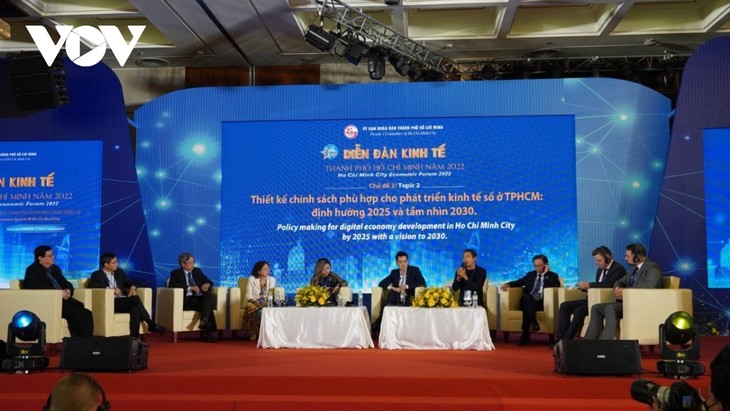(VOVWORLD) - Ho Chi Minh City is a pioneer in the development of digital economy in the country. The city has set a target that by 2025, the digital economy will account for 25% of the Gross Regional Domestic Product, and 40% by 2030. To achieve that goal, the city has been developing many policies to promote the development of the digital economy.
Gia An Co., Ltd. in Binh Tan district, specializes in manufacturing digital anti-theft locks and car GPS navigation devices. Thanks to digital transformation in the production and accounting process, this business saves costs and at the same time increases the production and business efficiency by 25 to 30 percent compared to the same period last year. The company is promoting digital transformation in its online sales because this process requires lots of human resources to update product and customer data. Pham Thuy An, Director of Gia An Co., Ltd., said the company needs support and appropriate technology solution consultation in its process of digital transformation. An said: “Digital transformation is essential for keeping up with market demand. For a technology company like us, digital transformation is very important and essential. We need a consulting unit that matches our capabilities and internal resources to find a digital transformation solution that is suitable for our finances and human resources.”
 Representatives at a Digital Economy Development Forum (Photo: Vinh Quang/ VOV) Representatives at a Digital Economy Development Forum (Photo: Vinh Quang/ VOV) |
Digital transformation is a need for many businesses in Ho Chi Minh City, but many businesses do not know where to start. According to the experience of successful businesses, digital transformation must be carried out from each stage and each part, and cannot be unorganized. As many enterprises face difficulties, Ho Chi Minh City has established a Digital Transformation Consulting and Support Center. In addition, many companies providing digital transformation services have also taken measures to cater to the demand of each sector, service, and the specialty of each business. Le Huu Nguyen, Director of MISA Company Branch in Ho Chi Minh City, said: “Digitization and digital transformation should be conducted in line with the need, and the financial conditions of each business. We apply technology to solve businesses’ every problem. We should not do it at the same time because it depends on the financial condition of each business, and the perception of the staff. If digital transformation is not appropriately carried out, it won’t be successful.”
Ho Chi Minh City has the highest percentage of population using smartphones in the country, fiber optic infrastructure, broadband internet, 3G, 4G mobile infrastructure covering all communes and wards. This also helps the city promote digital transformation. However, digital transformation needs high-quality human resources, technology infrastructure for digital transformation such as: 5G and post-5G connectivity, artificial intelligence, blockchain, the internet of things, to ensure network security and meet a certain quality. Dang Thi My Chau, Deputy General Director of Viet Locus Innovation Center, said that enterprises hoped that the government would create an ecosystem and build a diverse platform to be able to interact with the digital environment, and also promulgate synchronous, and highly interactive policies: “Ho Chi Minh City needs to have special mechanisms for businesses participating in digital transformation. Those businesses which have the ability and have applied digital transformation can take part in large and small scaled macro-economic projects.”
Digital transformation and development of the digital economy is an inevitable trend, but to achieve its goals, the city is focusing on investing in digital infrastructure for industry and services, construction. database, shared devices, accelerated digitization. The city also needs to support and promote the research and application of digital technology in the research sector and the industrial sector. Vo Van Hoan, Vice Chairman of Ho Chi Minh City People's Committee, said: “ The city is developing mechanisms and policies to support businesses in digital transformation which involves the State, platform businesses, especially IT and telecommunication ones. Under those mechanisms and policies, we reduce fees, or provide services for the platforms to operate. The city will do its utmost to our authority and will also make proposals to the government on supporting mechanisms and policies.
Digital transformation, building a digital government, a digital economy and a digital society are identified as "an inevitable trend in the world, an objective requirement of development, and Vietnam cannot stand aside in this process. Vietnam has actively adopted many policies to participate in the Industrial Revolution 4.0 and digital transformation.
 Businesses search for digital transformation solutions (Photo: Le Hang/ VOV) Businesses search for digital transformation solutions (Photo: Le Hang/ VOV) |
Vietnam has issued many guidelines and policies to actively participate in the implementation of the Industrial Revolution 4.0 and digital transformation. In September 2019, the Central Committee issued the Resolution No. 52-NQ/TW on a number of guidelines and policies to actively participate in the Fourth Industrial Revolution, setting out a target that by 2025, the digital economy will account for 20% of GDP. This target was also confirmed in the Prime Minister's June 2020 Decision which approved the "National Digital Transformation Program to 2025, with a vision to 2030".
Most recently, in March 2022, the Prime Minister issued a Decision approving the National Strategy for Development of the Digital Economy and Digital Society to 2025, with a vision to 2030, which sets out the key breakthroughs, identifies the important role of institutions, infrastructure, human resources, people and businesses in their development of digital economy.
The development of the digital economy is prioritized in the national development strategies and have been thoroughly prepared. After nearly four decades of industrialization, modernization and integration, Vietnam has become one of the countries with the fastest growing digital economies in Southeast Asia.
With a spirit of dynamism and creativity, Ho Chi Minh City is taking advantage of new business opportunities from digital transformation to participate and actively contribute to the digital economy. The city is also aiming to develop quickly, sustainably, inclusively and adapt in the context of many changes. However, the digital economy is still relatively new. In addition to the investment in infrastructure and leadership of local authorities, it requires contribution from scientists, experts, and policy makers, as well as valuable lessons from businesses, localities, and international organizations to ensure efficiency.
The digital economy requires entrepreneurs’ innovation and creativity to search for business opportunities. Ho Chi Minh City is perfecting mechanisms and policies and creating a favorable ecosystem for businesses to develop in the digital economy. Effective implementation of digital transformation and digital economy are important opportunities, helping Ho Chi Minh City in particular and Vietnam in general develop quickly and on par with other countries in the region.